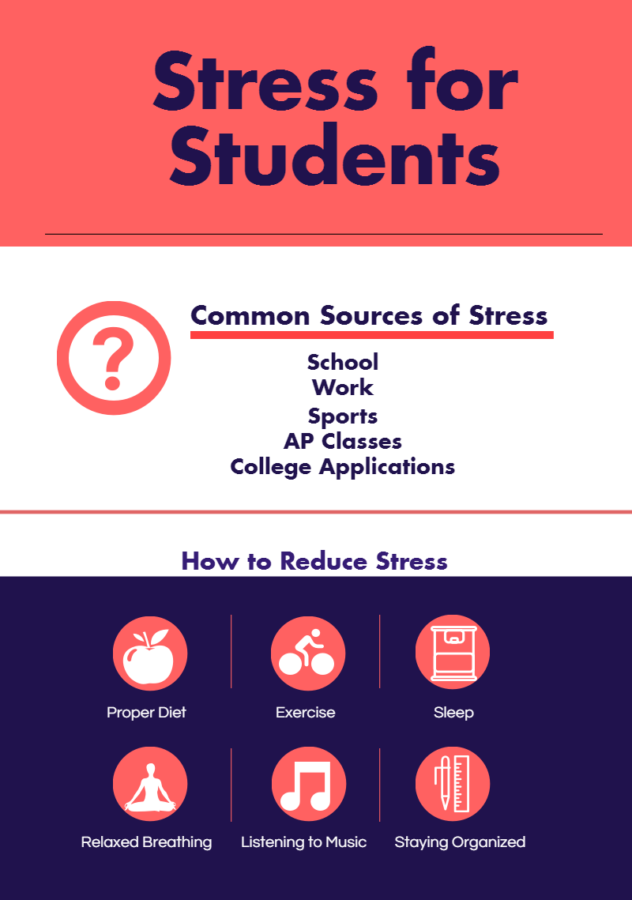Stress Reducing Strategies for the School Year
The common ways that students experience stress and steps that can be done to reduce it.
This time of year can be hectic; fall sports are in full swing, seniors are applying for college and everyone is getting back into the routine of the school year. All of the activities and loads of homework can leave students feeling stressed, but there are some simple ways to ease some of the school year stress.
According to the American Psychological Association, there are three types of stress. These are acute stress, episodic acute stress and chronic acute stress. Acute stress is the most common type of stress for everyone, including students, to experience. HealthCentral defines acute stress as a short term stress. If one experiences a small amount of acute stress it is usually fine, but too much acute stress can lead to exhaustion and some emotional distress.
Many people will experience acute stress on a day to day basis. Working on a tight deadline or giving a speech can all lead to this kind of stress. It is something that everyone will encounter; it is impossible to avoid or completely eliminate, but there are some ways that students can decrease and manage their levels of stress.
Acute stress is not always bad. At many times it can be motivating; it can push you to finish the paper that is due tomorrow or work hard towards a goal.
“Sometimes I like stress and it helps me work,” junior Jane Guidera said, “like when I was running the blood drive it was stressful but I liked being in charge of people and I liked that kind of stress.”
Students at OHS are also experiencing this acute stress in a multitude of ways. Homework and deadlines are a couple of examples of stress in the halls, along with college applications and sports. According to LearnPsychology, there are also symptoms that correlate with stress including: headaches, trouble sleeping and fatigue.
“During the school year students have more things to worry about: sports, extracurriculars, as well as maintaining good grades and friendships.”
— Jane Guidera
A national poll from the C.S. Mott Children’s Hospital ranks stress as the number five health concern for children. Other concerns in this study include bullying and childhood obesity.
“During the school year students have more things to worry about: sports, extracurriculars, as well as maintaining good grades and friendships,” Guidera said.
However, there are ways that students can easily decrease their stress levels. Things as simple as listening to music or doing breathing exercises are an effective way to make the student relaxed if they are stressed or anxious before a big test.
“I will play video games or sleep [to reduce stress],” junior Henry Jaffray said.
Another important aspect is eating right and exercising. According to the Anxiety and Depression Association of America, exercise is vital because it maintains and improves your physical and mental fitness – which can decrease stress. Stress can often times decrease energy level, but exercise can increase one’s energy level and cognitive function.
Another effective way to alleviate stress is sleep. All the homework and extracurricular activities that students have may cause sleep deprivation. It is vital for your mental and physical health to get the proper amount of sleep, but many students do not receive the recommended eight hours of sleep per night. Even a short power nap of one to two hours can help.
“I get about six hours of sleep per night,” senior Hannah Gronberg said, “I get home from practice late and have to do my homework.”
Stress is an aspect of everyday life that is almost impossible to eliminate, but with the right methods students can alleviate some of this uneasiness. Even in school, before a test, students can take a minute to relax themselves and eliminate their pre-test jitters.

Cami joined the paper staff because she enjoys writing articles for the paper. Outside of school, Cami is very active. She plays low attack for the Girls...













